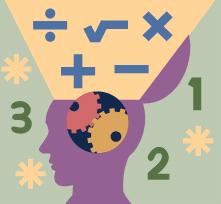
Northwest Academy of Sciences |
|
|
|
|
|
Our Curriculum
Our curriculum is a
The curriculum of our circles is a mix of the traditional Math
Circles topics and certain topics of school math that don't receive
sufficient attention in regular schools.
In addition, each teacher contributes his/her own favorite
topics,
and each circle moves ahead on it's own pace.
Our 'Senior Circle' students, who have been with us for almost 8
years, are familiar with a broad range of math topics listed below.
We believe that this list provides a good illustration of what the
students and teachers in a math circle are up to.
- Elementary problem solving techniques:
Pigeon Hole Principle, Parity, Story Problems.
Principles of Logical Reasoning. Accepted standards of
mathematical argument.
- Games Analysis: Notion of Strategy; Symmetry in Games; Winning
Positions, Analysis from the Endgame.
- Combinatorics: Counting Variants, Permutations, Binomial
Coefficients, Pascal’s Triangle, Properties of Binomial
Coefficients, Newton’s Binomial Theorem.
- Divisibility
and Remainders, Calculation of Remainders,
Divisibility Tests, Prime and Coprime Numbers.
- Graphs Theory: Notion of Graph, Graph Isomorphism, “Even Number of Odd Vertices”
Theorem, Connected Graphs, Trees, Euler’s Graphs, Solving
Problems Using Graph Theory.
- Invariants and Semi-Invariants.
Colorings, Remainders as Invariants
- Mathematical Induction
- Math. Logics
- Inequalities
- Conditional Probability, Independent Events, Formula of Full Probability, Infinite Sums and Limit Probabilities
- Geometry
- Metric spaces: Distance as an Abstract Notion, Definition of Metric Spaces,
Examples, Open and Closed Sets, Intersection and Union of Open and Closed Sets,
Sequences and Limits, Connectivity, Continuity,
Application to Analysis and Geometry
- Elements of Math Analysis: Limits and sequences
- Polynomials
- Elements of Linear Programming
- Elements of Game Theory
- Set Theory: Countable and uncountable sets. Density. Fractals.
Fractal dimensions.
- Group Theory
|
|